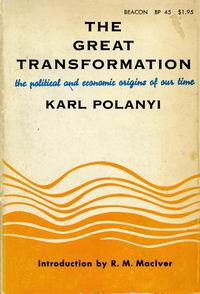
The Great Transformation
The political and economic origins of our time
Polanyi, Karl
Publisher: Beacon Press, Boston, USA
Year First Published: 1944
Year Published: 1968
Pages: 315pp Resource Type: Book
Cx Number: CX7441
Polanyi analyzes the social and political upheavals that took place in England during the rise of the market economy. Polanyi contends that the modern market economy and the modern nation-state should be understood not as discrete elements, but as a single human invention he calls the "Market Society".
Abstract:
Polanyi argued that the development of the modern state went hand in hand with the development of modern market economies and that these two changes were inexorably linked in history. His reasoning for this was that the powerful modern state was needed to push changes in social structure that allowed for a competitive capitalist economy, and that a capitalist economy required a strong state to mitigate its harsher effects. For Polanyi, these changes implied the destruction of the basic social order that had existed throughout all earlier history, which is why he emphasized the greatness of the transformation.
His empirical case in large part relied upon analysis of the Speenhamland laws, which he saw not only as the last attempt of the squirearchy to preserve the traditional system of production and social order, but also a self-defensive measure on the part of society that mitigated the disruption of the most violent period of economic change. The book also presented his belief that market society is unsustainable because it is fatally destructive to the human and natural contexts it inhabits.
Polanyi turns the tables on the orthodox liberal account of the rise of capitalism by arguing that 'laissez-faire was planned', whereas social protectionism was a spontaneous reaction to the social dislocation imposed by an unrestrained free market. He argues that the construction of a ‘self-regulating’ market necessitates the separation of society into economic and political realms. Polanyi does not deny that the self-regulating market has brought 'unheard of material wealth', however he suggests that this is too narrow a focus. The market, once it considers land, labor and money as "fictitious commodities" (fictitious because each possesses qualities that are not expressed in the formal rationality of the market) 'subordinate[s] the substance of society itself to the laws of the market.'
This, he argues, results in massive social dislocation, and spontaneous moves by society to protect itself. In effect, Polanyi argues that once the free market attempts to separate itself from the fabric of society, social protectionism is society’s natural response; this he calls the ‘double movement’. Polanyi did not see economics as a subject closed off from other fields of enquiry, indeed he saw economic and social problems as inherently linked. He ended his work with a prediction of a socialist society, noting, "after a century of blind 'improvement', man is restoring his 'habitation.'"
Polanyi makes the distinction between markets as an auxiliary tool for ease of exchange of goods and Market Societies. Market Societies are those where markets are the paramount institution for the exchange of goods through price mechanisms. Polanyi argues that there are three general types of economic systems that existed before the rise of a society based on a free market economy: Redistributive, Reciprocity and Householding.
* Redistributive: Trade and production is focused to a central entity such as a tribal leader or feudal lord and then redistributed to members of their society.
* Reciprocity: The exchange of goods is based on reciprocal exchanges between social entities. On a macro level this would include the production of goods to gift to other groups.
* Householding: Economies where production is centered around individual household production. Family units produce food, textile goods, and tools for their own consumption.
These three forms were not mutually exclusive nor were they mutually exclusive of markets for the exchange of goods. The main distinction is that these three forms of economic organization were based around the social aspects of the society they operated in and were explicitly tied to those social relationships. Polanyi argued that these economic forms depended on the social principles of Centricity and Symmetry and Autarky (Self-Sufficiency). Markets existed as an auxiliary avenue for the exchange of goods that were otherwise not obtainable. They relied on the social Principles of Centricity and Symmetry.
[Summary from Wikipedia, December 11, 2012]
Table of Contents
Preface
Part One: The International System
Chapter 1: The Hundred Years' Peace
Chapter 2: Conservative Twenties, Revolutionary Thirties
Part Two: Rise and Fall of Market Economy
I. Satanic Mill
Chapter 3: "Habitation versus Improvement"
Chapter 4: Societies and Economic Systems
Chapter 5: Evolution of the Market Pattern
Chapter 6: The Self-regulating Market and the Fictitious Commodities: Labor, Land, and Money
Chapter 7: Speenhamland, 1795
Chapter 8: Antecedents and Consequences
Chapter 9: Pauperism and Utopia
Chapter 10: Political Economy and the Discovery of Society
II. Self-Protection of Society
Chapter 11: Man, Nature, and Productive Organization
Chapter 12: Birth of the Liberal Creed
Chapter 13: Birth of the Liberal Creed (Continued): Class Interest and Social Change
Chapter 14: Market and Man
Chapter 15: Market and Nature
Chapter 16: Market and Productive Organization
Chapter 17: Self-Regulation Impaired
Chapter 18: Disruptive Strains
Part Three: Transformation in Progress
Chapter 19: Popular Government and Market Economy
Chapter 20: History in the Gear of Social Change
Chapter 21: Freedom in a Complex Society
Notes on Sources
Subject Matter Index
Index of Authors
Subject Headings


